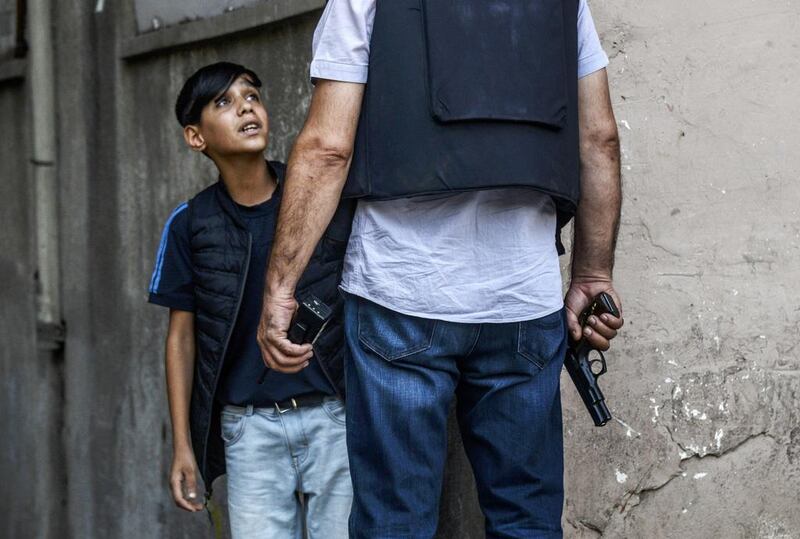ANKARA // Turkey scrambled fighter jets to the Syrian border on Thursday following cross-border clashes with ISIL militants in which a Turkish soldier was killed.
At least two other soldiers were wounded in the clashes – the most serious yet between the Turkish army and the extremist group.
Elsewhere, a policeman was shot dead and another was badly wounded in the majority Kurdish city of Diyarbakir. Three suspects were arrested in connection with the killing of two other police officers a day before.
Media reports said that Thursday’s clashes were close to the Turkish village of Elbeyli, an area where the armed forces have sent reinforcements in recent weeks.
Suleyman Tapsiz, the governor for Turkey’s Kilis province, said a border outpost was attacked from a region in Syria under ISIL control.
“Turkish soldiers returned fire after shots came from the Syrian side of the border, from the region where Islamic State militants are,” a Turkish official said.
Turkish tanks from the fifth armoured brigade returned the fire.
The soldiers were attacked by five militants, the Turkish military said, with one ISIL militant “captured dead” along with a rocket launcher and an AK-47 automatic rifle.
Mr Tapsiz said that the two wounded sergeants were not in a serious condition.
Turkey had reinforced its border at Kilis a day earlier, deploying elite special forces units there, another government official said.
The violence came just days after 32 people – mainly young activists preparing for an aid mission to Syria – were killed in a suicide bombing blamed on ISIL.
Monday’s attack in the southeastern town of Suruc highlighted fears about Syria’s conflict spilling onto Turkish soil.
It also inflamed tensions with Turkey’s Kurdish minority, which is unhappy over the lack of support provided by the government to Kurdish militias fighting ISIL inside Syria.
The military wing of the Kurdistan Workers’ Party claimed that the Wednesday killing of two police officers in the border town of Ceylanpinar, saying it was “revenge” for the suicide bombing in Suruc.
It accused the two officers, who were killed while sleeping in their home, of collaborating with ISIL.
The victims, aged 24 and 25, were given a funeral on Thursday, outside police headquarters in the regional centre of Sanliurfa.
“The martyrs never die, the people will never be divided,” dozens of police chanted, using a popular patriotic slogan.
“We will continue until the end of our battle even if we die,” said local police chief Eyup Pinarbasi. “The blood of our martyrs will not be left without a response.”
In the latest attack on police in Diyarbakir, the dead and wounded officers were targeted by armed men during a routine traffic check.
Turkey’s Nato allies have expressed concern about control of its border with Syria, which in parts runs directly parallel with territory controlled by ISIL.
US president Barack Obama spoke to Turkish president Recep Erdogan late on Wednesday. The two leaders agreed to work together to “stem the flow of foreign fighters” and secure the 900-kilometre border, the White House said.
Turkey announced on Wednesday that it was erecting a modular wall along part of its border with Syria, as well as reinforcing wire fencing and digging extra ditches.
Around half of the armoured vehicles that patrol Turkey’s borders are now along the Syrian frontier, another government official said.
Thousands of foreign fighters are thought to have travelled through Turkey to join ISIL in Syria and Iraq in the past few years, some of them with assistance from Turkish smuggling networks sympathetic to the militants.
* Agencies





